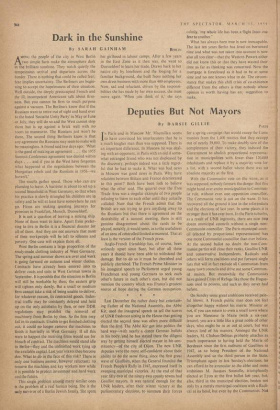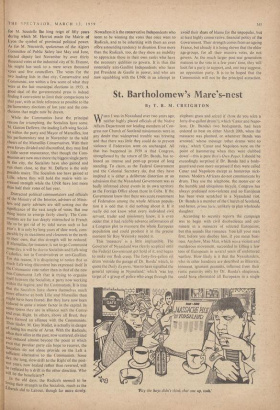Deputies But Not Mayors
By DARSI
E GILLIE PARIS
IN Paris and in Moscow Mr. Macmillan seems to have convinced his interlocutors that he is a much tougher man than was supposed. There is an important difference. In Moscow he was deal- ing with an opponent, in Paris.with an old if some- what estranged friend who was not displeased by the discovery, perhaps indeed was a little regret- ful that he had to make it. What was bad. news in Moscow was good news in Paris. Why have relations between Britain and France deteriorated to this point? Both have been loth to believe what the other said. The quarrel over the Free Trade Area was a singular example of two people refusing to listen to each other until they actually collided. Now that the French admit that the British are not trying to give anything away to the Russians but that there is agreement on the desirability of a summit meeting, there is still genuine disagreement about the cards to be played, notably, it would seem, as to the usefulness of an area of controlled limited armament. That at least is the version of the French press.
Anglo-French friendship has, of course, been seriously upset since Suez, but after all these years it should have been able to withstand the damage. But to do so it must be cherished and publicly cherished. The French Prime Minister in his inaugural speech to Parliament urged young Frenchmen and young Germans to seek each other's future in each other's eyes, but did not mention the country which was France's greatest source of hope during the German occupation.
Last December the rather dusty but entertain- ing Father of the National Assembly, the Abbe Kir, used the inaugural speech to tell the scores of UNR freshmen sitting in the House that getting elected the seecind time was often more difficult than the first. The Abbe Kir got into politics the hard way—with nearly a dozen German bullets in his body, 'and he has stayed there the diligent way by getting himself elected mayor in his con- stituency—of the city of Dijon. The new UNR deputies were the more self-confident about their ability to do the same' thing, since the first great wave of Gaullism, when the General founded the French People's Rally in 1947, expressed itself in sweeping municipal victories. At the end of that year fifty-two of the ninety-two county towns had Gaullist mayors. It was natural enough for the UNR leaders, after their winter victory at the parliamentary elections, to summon their forces for a spring campaign that would sweep the Com- munists from the 1,400 mairies that they occupy out of nearly 39,000. To make doubly sure of the completeness of their victory, they induced the Government to abolish proportional representa- tion in municipalities with fewer than 120.000 inhabitants and replace it by a majority vote for a list, with a second ballot where there was no absolute majority at the first.
With the Communist vote on the wane, as it was supposed, nobody foresaw the danger that this might hand over entire municipalities to Commun- ist rule, without even one opposition councillor. The Communist vote is not on the wane. It has recovered all the ground it lost in the referendum and the elections of last year. In some places it is stronger than it has ever been. In the Paris suburbs, as a result of UNR ingenuity, there are now two dozen municipal councils without a single non- Communist councillor. The Paris municipal coun- cil (elected by proportional representation) has one more Communist councillor than ever before. At the second ballot no doubt the non-Com- munist parties will close their ranks. Gaullist UNR and conservative Independents, Radicals and others will form coalitions and put forward single lists that will in fact exclude all Communists from many town councils and drive out some Commun- ist makes. But meanwhile the • Communists have gained Cities of Refuge like those the Hugue- nots used to possess, and such as they never had before.
On Sunday some great ambitions received pain- ful blows. A French public man does not feel altogether happy without his mairie. Minister or not, if you can return to even a small town where you are Monsieur le Maire (with a six-year tenure), you are a little like a great noble of other days, who might be in or out at court, but was always lord of his manors. Amongst the UNR leaders, M. Chaban-Delmas probably attaches as much importance to having held the Maine of Bordeaux since the first outburst of Gaullism in 1947, as to being President of the National Assembly and so the third person in the State. Triumphant again in last Sunday's elections, he can afford to be avuncular to the abler and more ambitious M. Jacques Soustelle, triumphantly elected at Lyon at the first ballot last year, but, alas, third in the municipal election, beaten not only by a merely municipal coalition with a Radi- cal at its head, but even by the Communists. Not for M. Soustelle the long reign of fifty years during which M. Herriot made the Maine of Lyon the symbol of provincial political power. As for M. Neuwirth, spokesman of the Algiers Committee of Public Safety last May and June, elected deputy last November by over thirty thousand votes at the industrial city of St. Etienne, his might has sunk to a mere seven thousand ' votes and five councillors. The votes for the two leading lists in that city, Conservative and Communist, are within a few score of what they were at the last municipal elections in 1953. A good deal of the governmental press is indeed finding it convenient to limit their comparisons to that year, with as little reference as possible to the parliamentary elections of last year and the con- clusions that might now be drawn.
While the Communists have the principal reason for triumphing, the Socialists have some. M. Gaston Defferre, the leading Left-wing Social- ist within the party and Mayor of Marseilles, lost his parliamentary seat in November to the wild cheers of the Marseilles Conservatives. With their own forces divided and discomfited, they may find a little secret reassurance, that though the Com- munists are now once more the biggest single party in the city, the Socialists have also gained and run them close, so that M. Defferre is the only Possible maire. The Socialists too have gained at Lille, where they will hold the mairie with in- creased strength while the UNR -have lost more than half their votes of last year.
Distracted political commentators and officials of the Ministry of the Interior, advisers of Minis- ters and party advisers are still sorting out the significance of the vast tangle of votes. But one thing seems to emerge fairly clearly. The Com- munists are far too deeply entrenched in French life to be got rid of by tidal waves such as last Year's. It is only by long years of slow work, com- parable by its steadiness and closeness to the earth to their own, that this strength will be reduced. If Marseilles, for instance, is not to go Communist Some day, it will be due to Socialists and Left-wing Catholics, not to Conservatives or neo-Gaullists. or this reason, it is disquieting to notice that so much Left-wing discontent has expressed itself in the Communist vote rather than in that of the new non-Communist Left that is trying to organise itself between the Socialists, a party now working Within the regime, and the Communists. It is true that the Socialists have shown themselves much more effective at both Lille and Marseilles than might have been feared. But they have now been reduced to quite a minor factor in the capital. In some towns they are in alliance with the Centre, and even Right. In others, above all Brest, they have formed an alliance with the Communists. Their leader, M. Guy Mollet, is actually in danger of losing his tnairie of Arras. With the Radicals, oftentheir allies in the past, now scattered, divided and reduced altnost, beyond the point at which even that peculiar party can hope to recover, the Socialists do not alone provide on the Left a sufficient alternative to the Communists. Some day, the long, slow drift to the Right of the post- War years, now braked rather than reversed, will be replaced by a drift in the other direction. Who Will be the beneficiary? In the old days, the Radicals seemed to be insing their strength to the Socialists, much as the Liberals did to Labour, though far more slowly.
Nowadays it is the conservative Independents who seem to be winning the votes that once went to Radicals, and to be inheriting with them an even itribre astounding tendency to disunion. Even more than the Radicals, too, do they show an inability to appreciate those in their own ranks who have the necessary qualities to govern. It is thus the essentially anti-Gaullist Independents who have put President de Gaulle in power, and who are now squabbling with the UNR in an attempt to avoid their share of blame for the unpopular, but at least highly conservative, financial policy of the Government. Their strength comes from an ageing France, but already it is being shown that the older age-groups, for all their massive votes, do not govern. As the much larger post-war generation matures to the vote in a few years' time, they will look for a party to support, and, one may sunpose, an opposition party. It is to be hoped that the Communists will not be the principal attraction.



















































 Previous page
Previous page